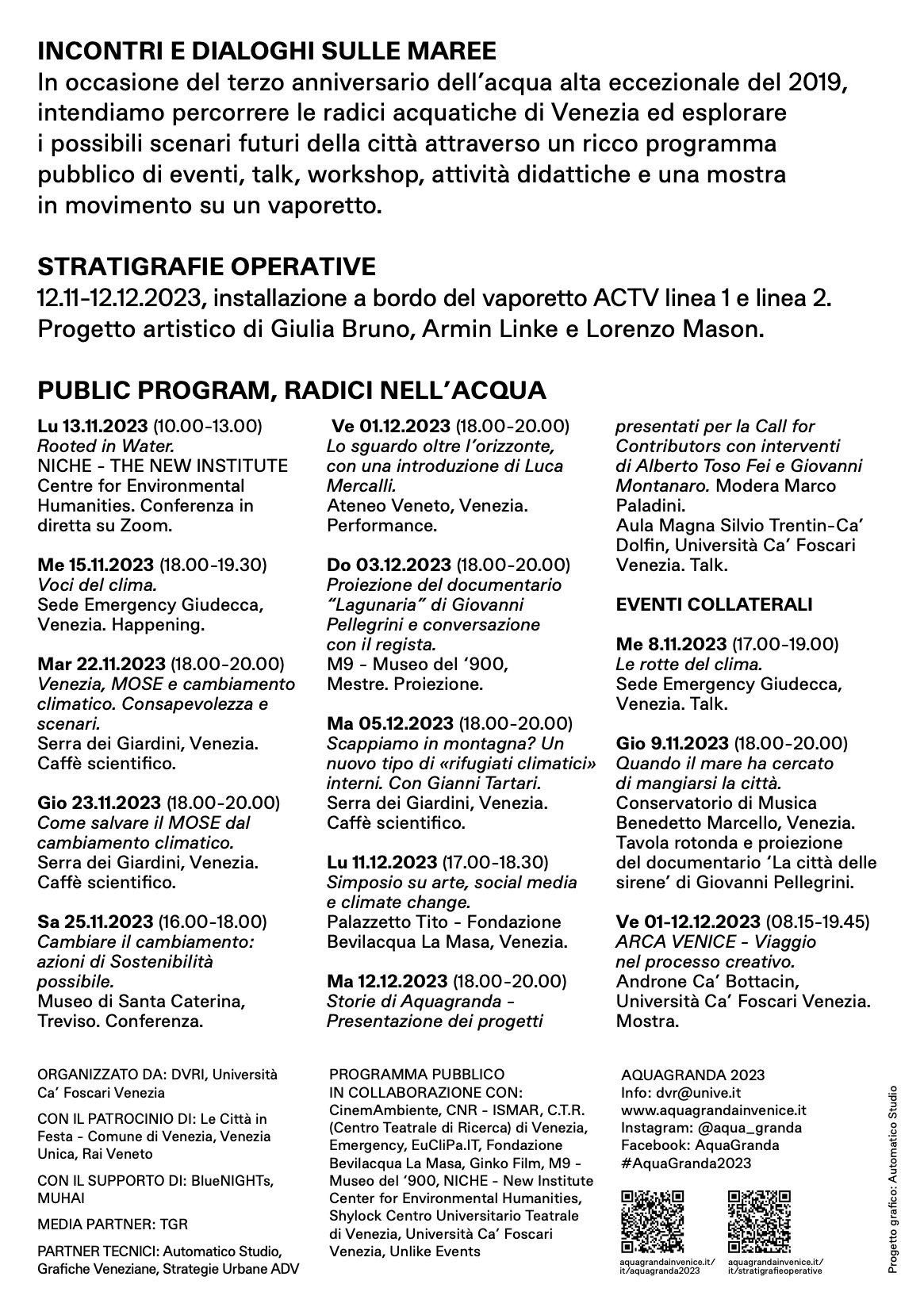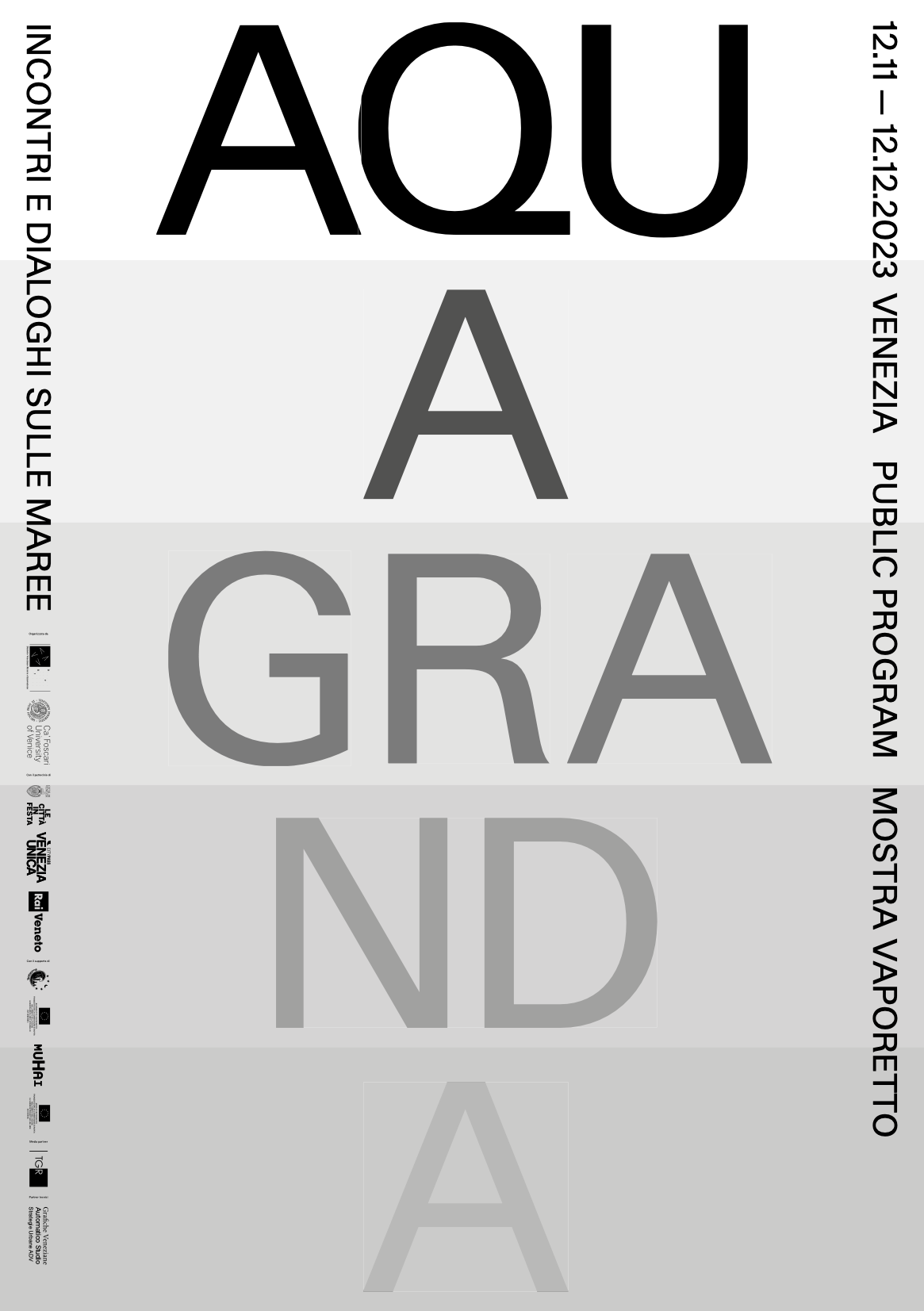Rooted in water | public program
Roots in the Water is the public program of the third edition of AquaGranda 2023 - Incontri e dialoghi sulle maree, a cultural and educational moment that focuses on the memory of climatic events and their impact on the lagoon ecosystem.
We aim to delve into the aquatic roots of Venice and explore the potential future scenarios of the city through a rich public program of events, talks, workshops, and educational activities that will fill the city with a tide of extraordinary energy.
Monday, November 13, 2023, 10 AM - 1 PM
Online EventRooted in Water
Live Zoom Conference
Talk with Armin Linke, Giulia Bruno, Lorenzo Mason, Costanza Sartoris, and Carlo Santagiustina. Moderated by Emiliano Guaraglio
IClimate change is gradually transforming the global landscape, particularly the relationships between humans and nature, coastal communities, and aquatic ecosystems.
Following the extraordinary high tide event that afflicted Venice in 2019, artists Armin Linke, Giulia Bruno, and Lorenzo Mason collaborated with the AquaGranda project to collect and annotate photographs and materials provided by local organizations and entities operating in Venice during and after this extreme event: to assist the community, mitigate the damage caused by the tide, and make the city and the lagoon livable again.
These materials and operational photographs convey tacit local knowledge, which, once made explicit through a participatory annotation process, becomes indispensable in understanding and addressing extreme climate events, both present and future.
Along with the creators of the Operational Stratigraphies work, AquaGranda researchers, and a series of expert guests, we will explore the use of annotated operational photography as a form of participatory research, aimed at documenting and activating memory. We will also highlight the challenges that climate change poses to human activity and the livability of coastal areas.
Event organized by DVRI in collaboration with NICHE - The New Institute Center for Environmental Humanities.
Wednesday, November 15, 2023, 6-8 PM
Venue - Emergency, Calle Fondamenta S. Giacomo, 212, 30133 Venezia VEVoices of Climate
Happening
An event on the occasion of the exhibition "Where Are We Going? Climate and People" organized by Emergency Venice and open until November 30. The installation "Viviamo tutti sotto lo stesso sole" curated by studio +fortuna will come to life thanks to the exceptional work of actors and actresses from the C.R.T. Centro Ricerca Teatrale di Venezia. They will give voice to the stories collected by Emergency in the most remote and abandoned places on Earth. A meeting aimed at promoting awareness and understanding of phenomena related to climate change and its direct impact on people.
The performance is made possible by Lucrezia Bonazzi and Gabriele Pavon with the participation of Savino Liuzzi.
The event is organized by Euclipa and DVRI - Venetian District for Research and Innovation, with the support of C.T.R. Venezia on the occasion of the exhibition "Where Are We Going? Climate and People" organized by Emergency Venice.
Tuesday, November 15, 2023, 6-8 PM
Serra Giardini, Via Giuseppe Garibaldi, 1254, 30122 loc. Castello VE
Venice, MOSE, and Climate Change. Awareness and Scenarios
Scientific Café
The event, open to the public and interaction with the organizers, will be based on scientific studies, reflections, and territorial scenarios developed by the first researcher Georg Umgiesser (CNR-ISMAR) and professors Lorenzo Fabian (IUAV University of Venice) and Ludovico Centis (University of Trieste). They will discuss crucial topics for Venice, such as the presence of MOSE and its operation in the coming decades in relation to climate change and the expected significant rise in sea levels.
Organized by DVRI in conllaboration with il CNR - ISMAR.
Thursday, November 23, 2023, 6-8 PM
Serra Giardini, Via Giuseppe Garibaldi, 1254, 30122 loc. Castello VE
Saving MOSE from Climate Change
Scientific Café
The mobile gates of Venice (MOSE) are protecting the city from high water. However, climate change will question the functionality of the gates already in the second half of this century. With a sea level rise of 50 cm, the gates will have to be closed once a day. By injecting water into the ground, it is possible to raise Venice by 30 cm. This fact allows for extending the life of the mobile gates for another 50 years.
Organized by DVRI in conllaboration with il CNR - ISMAR.
Saturday, November 25, 2023, 4-6 PM
Coletti Hall, Civic Museums of Treviso - Civic Museum of Santa Caterina
Changing Change: Possible Sustainability Actions
Talk
On November 25, 2023, at 4:00 PM at Coletti Hall, Civic Museums of Treviso - Civic Museum of Santa Caterina, the event "Changing Change: Possible Sustainability Actions" will be held. The event will reflect on climate change and possible strategies. The "AquaGranda. A Digital Collective Memory" project, conceived and carried out by Ca’ Foscari University of Venice and DVRI - Venetian District for Research and Innovation, will be presented. It tells the story of the exceptional high tide in 2019 through tens of thousands of contributions collected from social networks. The presentation will include some digital findings from the "AquaGranda a Digital Collective Memory" Digital Archive, with the participation of the project team. Present at the event will be Marco Cosmo, Director of the Venetian District for Research and Innovation (D.V.R.I.); Marco Paladini, Archaeologist and head of the AquaGranda memory collection campaign; and Carlo Santagiustina, scientific supervisor of the AquaGranda Archive and researcher at the Department of Management. The event will conclude with a debate on sustainable actions currently possible in the world of responsible production, with testimonies and best practices from Labomar, a B-Corp specializing in nanotechnologies, Cantina Pizzolato, and Amorim Cork, an international cork producer and expert in creative reuse.
The event will be moderated by Dr. Tommy Meduri, an expert in sustainability processes and balances.
Orgnized by DVRI and Unlike Events, in occasion of “ Fiore del Deserto” Exhibition by Silvia Canton
Friday, December 1, 2023, 6-8 PM
Ateneo Veneto (Campo S. Fantin, 1897, 30124 Venezia VE)
"Looking Beyond the Horizon" - Female Achievement and New Motherhood in the Context of the Climate Crisis. Introduced by Luca Mercalli.
Performance
Reading of unpublished texts curated by researchers, professionals, and activists from Venice. The authors look beyond the horizon in search of a connection between female achievement and new motherhood in the context of the climate crisis, with particular attention to the essential role of water and predictions of rising sea levels. Songs performed by Valentina Fin and Marco Centasso's double bass accompany the readings. Climatologist Luca Mercalli will open the event.
Project by Bianca Nardon. Artistic coordination by Sabina Tutone.
The event is organized by DVRI in collaboration with Shylock C.U.T.
Sunday, December 3, 2023, 6-8 PM
M9 - Museum of the 20th Century, Mestre
Screening of the documentary "Lagunaria" by Giovanni Pellegrini and conversation with the director.
Film Screening
A voice from a distant future tells the story of a city that once was one of the most famous in the world, a city born from the water. Amid legends, myths, and rumors, the narrator describes a daily life made of boats, sometimes mythical, sometimes dramatic and poetic, bringing out its relationship with the surrounding lagoon, its waters, its muddy islands, and the animals that inhabit it. Did that city ever exist? Is it still inhabited, or has it turned into a tourist park? Did it withstand the flood or was it submerged by the waters? An undefined tale emerges as a discovery of a unique and fragile city that, in its own way, speaks of every city on Earth.
The event is organized by DVRI with M9 - Museum of the 20th Century in collaboration with CinemAmbiente and Ginko Film.
Tuesday, December 5, 2023, 6-8 PM
Serra Giardini, Via Giuseppe Garibaldi, Castello VE
Are We Fleeing to the Mountains? A New Type of Internal "Climate Migrants"
Scientific Cafè
Large urban centers and plain areas are the most affected by high temperatures, heatwaves, strong winds, short but intense rainfall, etc., impacting the health and safety of people. For this reason, temporary or permanent relocation to inland and mountain areas can represent an adaptation solution to climate change. EuCliPa.It, with the MICLIMI project, thanks to the contribution of the Cariplo Foundation, has investigated internal migration due to climate causes or co-causes in northern Italy. We will discuss this with Gianni Tartari, Ambassador for the European Climate Pact with Euclipa.
Event organized by DVRI in conllaboration with EuCliPa.IT.
Monday, December 11, 2023, 5 PM - 6:30 PM
Palazzetto Tito - Bevilacqua La Masa Foundation, Venice
Symposium on Art, Social Media, and Climate Change
Talk
During the symposium, artists and curators will discuss the artistic practices used to explore the relationship between climate change, technology, and the spreading of news about climate, nature, and solutions. The symposium will involve the resident artists of the Bevilacqua La Masa Foundation, the artists and curatorial collective of AquaGranda, and some prominent figures in the national art scene
Event organized by DVRI and Bevilacqua La Masa Foundation
Tuesday, December 12, 2023, 6-8 PM
Ca’ Dolfin, Aula Magna Silvio Trentin, Venice
AquaGranda Stories - Presentation of Projects Submitted for the Call for Contributors with interventions by Alberto Toso Fei and Giovanni Montanaro. Moderated by Marco Paladini.
Talk
After collecting dozens of stories and memories of the night of November 12, 2019, and other tide episodes sent in recent months by the Venetian community, we will have the opportunity to present and recount fragments of life lived with guests and friends. Presenting the textual contributions we have collected will be Alberto Toso Fei and Giovanni Montanaro.
The talk will be moderated by Marco Paladini.
Event organized by DVRI in conllaboration with Università Ca’ Foscari Venezia.
Collateral events:
Wednesday, November 8, 2023, 5- 7 PM
Emergency Venue, Calle Fondamenta S. Giacomo, 212, 30133 Venezia VE
"The Routes of Climate" organized by Emergency and Euclipa in collaboration with Syntasis on the occasion of the exhibition "Where Are We Going? Climate and People."
Conference
Climate migrants have no face, no name, and not even humanitarian protection. Yet they exist and represent experiences we can no longer ignore and must address, both legally and humanitarianly. It is little known that the term 'climate migrant' is not yet legally sustainable. The "Routes of Climate" project initiated by the Systasis association, among other partners, including EuCliPa.IT, aims to address this definitional gap. By collecting qualitative data on the experiences of those who must leave their land due to climate causes and co-causes, the project seeks to promote awareness of the issue and develop new strategies for legal protection.
In collaboration with Euclipa, on the occasion of the exhibition "Where Are We Going? Climate and People."
Thursday, November 9, 2023, 6-8 PM
Conservatorio di Musica Benedetto Marcello (S. Marco, 2810, 30124 Venezia VE)
"When the Sea Tried to Devour the City - The City of the Sirens for the Aquagranda Anniversary."
Roundtable and screening of the documentary "The City of the Sirens" by Giovanni Pellegrini
Screening of the documentary "The City of the Sirens" by Giovanni Pellegrini. It will be preceded by a roundtable discussion with GIOVANNI PELLEGRINI, the director of "The City of the Sirens," ROBERTO GOTTIPAVERO, the director of the Benedetto Marcello Conservatory of Music in Venice, MELISSA CONN, the director of the Venice office of Save Venice, and CARLO SANTAGIUSTINA, a researcher at Ca' Foscari University of Venice.
Organized by Ginko Film in conllaboration with Conservatorio Benedetto Marcello
Friday, December 1 - Tuesday, December 12, 2023, 8:15 AM - 7:45 PM
Ca’ Bottacin Atrium, Ca’ Foscari University of Venice
ARCA VENICE - A Journey into the Creative Process
Exhibition
At the conclusion of Alessandro Zannier's (Ottodix) year-long residency, you will have the opportunity to delve into the artist's reflections and discover the birth of the ARCA project, particularly the Venetian declination (from which ARCA VENICE originated). On the ground floor of Ca' Bottacin, home to DVRI, a series of prints will illustrate the path from concept to performances, to collaborations with the organizations (DVRI members) he has worked with in recent months.
During the opening on December 1 at 6:00 PM, the artist will share his Venetian experience with participants and be available for questions about the creative process and the scientific foundations of his works.
Organized by DVRI


Testo curatoriale di Gabriella Traviglia
Radici nell'acqua
The last time the high water siren sounded for so long was in 2019, since then the high water has not reached Venice with that power anymore. It almost seems like the lagoon has been "tamed" and that we are quickly getting used to a new aquatic landscape, immune to the flood phenomena, which redefines our relationship with the tide.
The tide has always been a central element for Venetians in defining the relationship between the city, the lagoon, and the sea. A relationship that has become critical with the increasing frequency of exceptional high waters, reaching catastrophic peaks in 1966 and 2019.
The Venetian community was used to the arrival of high water: during certain periods of the year, boots were always at hand, alternative routes were known to avoid the most flooded areas, flood barriers in the houses were raised, and maybe people would have even organized a trip to San Marco to admire the square beautifully reflected in a pool of water. Until 2019, everyone could see the increase in the frequency of "high water" episodes, caused by the combination of rising average sea levels due to global warming and the sinking of the lagoon floor.
The activation of MOSE, after the events of 2019, has changed the relationship between Venice and the tides. While on one hand it is protecting the city from further flooding, on the other hand it has reduced attention to the phenomena of the tide and the natural cycles associated with it.
The risk is that a tidal culture will be lost, of how tides regulate the relationship between the lagoon, its ecology, and the city, or that the growing frequency of exceptional peaks and their connection to the ongoing climate changes will not be perceived, in the illusion that the sea has indeed been "tamed". High water was the source of a precise knowledge of the lagoon and its rhythms, but also of the city, its paths, its altimetric profile, and its social stratification.
Venice is a city that lives in symbiosis with water, a city that lives through cycles and rhythms. However, something has now changed: the image of the city underwater already belongs to the past, in some way. Some may be relieved; others nostalgic; or even both.
In any case, these interventions contribute to giving a new image to Venice, with new geographies and new scenarios that are gradually unfolding. These changes will influence tourism, the economy, and the culture of the city, and its inhabitants are already reacting to them. There is much to explore and observe in this phase of transition for Venice. What will be the new face of the Venice Lagoon?
We cannot say that the fragile balance between land and water has been restored, quite the opposite in some perspectives, but in the historic city-center of Venice, houses, businesses, and boats are currently protected. There is a before and an after. The tide continues to exist: it comes and goes cyclically. But while before it was in plain sight, invading, nourishing, destroying, and recreating the lagoon, now the tide has become less visible.
Less visible in everyday life, but it remains a subject of attention and scientific research: how has the perception of everyday life in the city changed since 2019 compared to the image derived from data from scientific institutions? What does it mean to recreate a new tidal culture in the presence of important hydraulic and environmental engineering interventions, such as MOSE, which have profoundly changed the relationship between tides and the city? How can we relearn to observe the cycles of tides and their relationship with the ecosystem surrounding the city?
On this third anniversary of the exceptional high water of 2019, we therefore want to go back to talking about the tide; to explore the new geographies of an exceptional tide that is now "invisible" and to investigate the new relationship with the tide in the lagoon ecosystem. We will listen to the sirens once again to make the tidal culture visible through the memories rooted in water.



